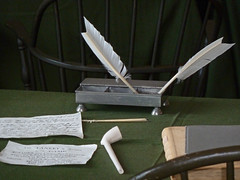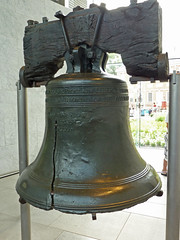There are two endings to the story of Don Quixote. [Spoilers for a 400 year-old book and 60 year-old musical]
In both versions, Don Quixote is a country gentleman, Alonso Quijano, who loses his grip on modernity, or reality if you prefer, and lives as if he is part of the age of honorable knights and romances, castles and giants, magic and noble women. He is sometimes humored, sometimes even encouraged, but also beaten and defeated by people of evil intent (or just jobs to do). His sidekick, Sancho Panza, endures a great deal as well in the hopes of promised rewards and status. It is a comedy based on the idea that there are no longer any knights or nobility in the world, but living as if there are produces absurdity and drama.
In both versions, Don Quixote is defeated by his relatives and friends, forced to face reality, abandon his fantasies and identity, and return home for a time before he passes away.
The Man of La Mancha, the musical based on Cervantes’ book and life, ends in a tragic triumph: Don Quixote, having been broken by reality and returned home, is revived by the visit of his squire and lady, ultimately reprising “The Impossible Dream” with them (and the whole rest of the cast), reclaiming his name and declaring that his adventures will continue, and then dying. This was the version I grew up with: the noble, if mad, pursuit of virtue could provide solace for the world, and inspiration. Even the worst of society – the illiterate, the criminal, the poor – could see the value in striving for grace and healing; in fact, perhaps could only see it through the intervention of someone oblivious to the mundane, gross realities of life. [Or not oblivious, perhaps, so much as impervious, a choice, according to the character Cervantes]
Don Quixote, the original novel, ends in a complete defeat for romance and virtue in the modern world: Don Quixote, having been beaten and forced home without being disabused of his fantasies, falls ill and returns to his original identity, ultimately repenting of his adventures, banning his daughter from marrying any man who reads chivalric romances in his will, and dying as Alonso Quijano. There is no dramatic redemption, no constituency of loyal retainers, only a reassertion of modernity, sense, and cold, hard reality.
I’ve been thinking about those two endings lately. I’ve always identified a bit with Don Quixote (as well as Charlie Brown, but that’s a discussion for some other time), seeing myself as something of a dreamer, an idealist who believes in the power of truth, thoughtfulness, the perspective of knowledge and experience, and the value of seeing the world as a collective endeavor. Being an academic, and a historian at that, almost seems like an overdetermined result.
Now I am stepping away from that mission, that quest, that impossible dream: after nearly a lifetime in schools as a student and teacher, I have resigned my position at Pittsburg State effective this summer. The reasons are personal, family-related, and not terribly relevant, but an opportunity arose and we are taking it, though the risks and uncertainties are substantial.
The risks and uncertainties of staying in academia as a historian at a public institution in Kansas are also substantial. I don’t have to rehash the current discourse over generative language tools, the political climate of conservative revanchism, the fiscal collapse of universities, and a public sphere buffeted by algorithms and editorial distortions and attention-seeking. Kansas legislators considered a bill this last session that would have weakened or eliminated the protections of tenure, and there’s no reason to believe they won’t try again; funding has not kept pace with inflation and tuition is vulnerable to fluctuations beyond our control both demographic and political. The state now has a ban on “gender identifying pronouns or gender ideology…on state employee’s email accounts and any other form of communication” which is going to render my student information form illegal, not to mention my Canvas display name. Good thing they never discovered my social media feeds.
I remain convinced that the critical method of history is the most fundamental and powerful tool we have against propaganda and ideology, that a historically informed citizenry is vastly preferable to any alternative, that the truth matters and that we are nowhere close to answering all of the interesting and troubling questions that lie in our narratives, our analyses, and our archives. I have not abandoned the dream of a better, more historically sophisticated and humane world, though I am not at this time convinced that it can be achieved in our institutions of education.
But for all the tilting at windmills I’ve done – assigning whole books, discussion boards, having students write reviews and comprehensive final essays, hoping to break through the myths of samurai and geisha and mandarin and emperors with actual writings and lives, blogging and public writing – I don’t see a chorus of inspired folk around me. I don’t hear my students echoing the lessons I tried to teach in later semesters, or any kind of ripple effect. There are folk teaching history who have those kinds of successes and influence, but I don’t see it myself.
Not that I don’t have some students enthusiastic about history, even some who come back for more than one world history requirement. I feel some qualms, honestly, about the ones who apply for our master’s program in the hopes of a career in education or public history, or as a way-station to a doctorate; I tell myself that things may change by the time they are done, that it may be worth more than just the satisfaction of study and learning.
I don’t know what I’ve left behind or how to judge my work, but it feels more like the book: modernity wins, the sordid, concrete exercise of power and money, while virtue and striving are left behind. I said to my colleagues,
My thanks to you all for a productive and friendly environment, and support in our times of difficulty, as we have endeavored to make the world a better, or at least more comprehensible, place for our students and communities.
I say the same to my online communities, just as much my colleagues in this collective exercise that blends the faculty lounge with the public square, where we can commiserate as well as educate, or at least correct. I’m not really going away, but I’m going to have to adjust to being out of the cycle of semesters and academic years, to having no contemporary experience to share, to having no educational agenda in my consideration of new scholarship or technologies. I’m going to need a new schtick when my jokes don’t land on social media, since “This is why I don’t tell jokes in class” will not be true anymore.
Change happens because history is people.

